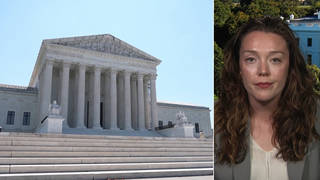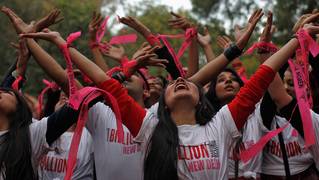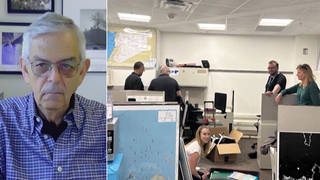
Guests
- Vthe award-winning playwright and creator of The Vagina Monologues and V-Day, a global movement to stop violence against women and girls. Her new memoir is called In the Body of the World.
- Christine Schuler DeschryverCongolese human rights activist with V-Day. She is the director of City of Joy, a revolutionary community for women survivors of gender violence in Bukavu.
Eve Ensler is the award-winning playwright and creator of “The Vagina Monologues” and V-Day, a global movement to stop violence against women and girls. V-Day, in turn, gave rise to One Billion Rising, a Feb. 14, 2013, event urging women and men to “strike, dance, rise” against violence. Ensler is out with a new memoir, “In the Body of the World,” an exploration of the female body — how to talk about it, how to protect it and how to value it. She shares her deeply intimate, painful relationship with her own body and how it has changed throughout her life — from being raped by her father to struggling with anorexia, from battling uterine cancer to reclaiming her body when dancing with the women of the Democratic Republic of Congo. Ensler joins us to discuss her book and her campaign against gender violence, along with Christine Schuler Deschryver, a Congolese human rights activist with V-Day. Schuler Deschryver is the director of City of Joy, a revolutionary community for women survivors of gender violence in Bukavu.
Transcript
AARON MATÉ: Well, we spend the rest of the hour with someone who has fought tirelessly for women’s rights here in the U.S. and around the world, Eve Ensler. She is the award-winning playwright and creator of The Vagina Monologues and V-Day, a global movement to stop violence against women and girls. V-Day, in turn, gave rise to One Billion Rising, a February 14th, 2013, event urging women and men to “strike, dance, rise” against violence.
AMY GOODMAN: Eve Ensler is out with a new memoir called In the Body of the World. It’s an exploration of the female body, how to talk about it, how to protect it, how to value it. She shares her deeply intimate, painful relationship with her own body and how it’s changed throughout her life, from being raped by her father to struggling with anorexia, from battling uterine cancer to reclaiming her body when dancing with the women of the Democratic Republic of Congo. She writes, quote, “We are the people of the second wind. We, who have been undermined, reduced, and minimized, we know who we are. Let us be taken. Let us turn our pain to power, our victimhood to fire, our self-hatred to action, our self-obsession to service, to fire, to wind.”
Eve Ensler is here with us in New York. We are also joined by Christine Schuler Deschryver, a Congolese human rights activist with V-Day, the director of the City of Joy, a revolutionary community for women survivors of gender violence in Bukavu, Democratic Republic of Congo. She and Eve will be speaking tonight about City of Joy here in New York at the Paley Center for Media.
Eve Ensler, Christine Schuler Deschryver, it’s great to have you both back in our studios. Eve, you are on a worldwide tour, In the Body of the World. What is your message in this book?
EVE ENSLER: Well, I think, for many of us who have been traumatized, which is kind of all of us, to some degree, whether you’ve had primary trauma or secondary trauma, to witnessing trauma, like the—you know, I’m thinking of the Iraq veteran you were talking about today. I mean, we’ve all been part of trauma. I think, at an early age or at any point in our life, it separates us from our bodies and from ourselves, and we progressively become more and more detached from our hearts, from our ability to be compassionate, from our connection to our own bodies, but also from the Earth and from each other. And I think, for me, the journey back to my body has taken me many, many years to get back inside, after suffering enormous violence when I was younger. And there’s been many paths to get back, but I think when I got uterine cancer and I suddenly woke up after nine hours of surgery with all kinds of body parts missing and rearranged, for the first time in my life I was in my body. And that—what I’m kind of referring to as the “cancer conversion” was this journey that went for about nine months, where I went through infections and chemo. But by the end of it, I was back inside. And what it’s made me aware of is the more inside ourselves we are, the more connected we are to other people and to the plights of other people, to the suffering of other people, but also to the Earth itself.
AARON MATÉ: Well, Eve, can you explain how you came to this conclusion, and talk about your healing journey?
EVE ENSLER: Yes, I mean, I think the journey with cancer was really arduous and really difficult. I had stage III/IV cancer, and it had invaded parts of me, so a lot had to go. And I think one of the more interesting parts of the journey was when I had to go for chemotherapy, because I was absolutely terrified of chemotherapy. And I just wasn’t going to do it. I was—I just was too scared. And an old therapist came by out of nowhere to help me, and she just gave me this kind of frame for it, which was to see the cancer as an empathetic warrior, something that was not for me, but for the cancer, for the perpetrators, for all the—my father, for the rapist, for—and I got to poison them, and they were never going to come back. And that frame really allowed me to go into chemo and say, “OK, I’m going to now get rid of all these things in my body that have prevented me from actually living in my body—you know, my trauma, my pain, my sorrow, my guilt, my shame.” And, I think, as that was going on, we were building City of Joy in the Congo. And Christine was kind of on the front lines of doing that. And our relationship and my connection to making that happen and kind of living for that to happen allowed me to keep going. So there was this kind of synergy between the two.
AMY GOODMAN: And I want to talk about the City of Joy in the context of a new study that’s warning more than a third of women worldwide are victimized by sexual or physical assault from a partner. Unveiling the findings, Dr. Claudia García-Moreno of the World Health Organization said, “Violence against women is a global epidemic.”
DR. CLAUDIA GARCÍA-MORENO: This report for the first time brings together data on the prevalence of different forms of violence against women, and it shows that the problem is widespread, and it’s unacceptably high. One in three women globally are affected by either physical or sexual violence from a partner, or sexual violence by a non-partner. Violence against women is a global problem, that it is widespread and occurs in all regions at unacceptably high levels.
AMY GOODMAN: According to the study, 40 percent of women killed worldwide were slain by a partner. Christine Schuler Deschryver is with us, as well, Congolese human rights activist who founded Body of Joy.
EVE ENSLER: City of Joy.
AMY GOODMAN: City of Joy. Eve Ensler is with us, author of In the Body of the World. City of Joy, what is it, Christine?
CHRISTINE SCHULER DESCHRYVER: City of Joy, I think—you know, they used to say that Congo is the worst place to be a woman, but I think City of Joy is like one of the best place, because it’s a place where we empower women. We don’t assist women; we empower them. And it’s a V-Day program. And until now, we are on our fourth session, and we already trained 222 women. They do have different—a different training, and when they go back into their villages, they are sort of role models to become leaders.
AMY GOODMAN: Why do they come to the City of Joy? Who are these women?
CHRISTINE SCHULER DESCHRYVER: You know, these women are girls and women from 15 'til 30, and all of them are survivors of gender violence. We've worked with grassroots, with the local NGOs, and we have a different kind of criterias, like ages and survivors of different kind of violence. And then we go and interview them on the ground, and after that, we select 90 of them to come to City of Joy, and they stay for six months.
AARON MATÉ: And City of Joy took part, of course, in One Billion Rising?
CHRISTINE SCHULER DESCHRYVER: Of course, and we had the privilege to have Eve Ensler with us, and most of our funders, so it was—it was kind of amazing. And I have to say, for the first time also, like, we saw so many people involved. Like, even the general of the army, he signed a commitment with V-Day, and it never happened before, policemen, army, you know, to support the women. So, until now, the impact is huge.
EVE ENSLER: I have a thing with Christine, because she’s so modest. I mean, what’s really happening at City of Joy is that we’re seeing incredible transformation. I was there to visit this last class, and we’re seeing girls who, for example, arrive with children who are the products of rape, who end up being able to love their children; people who arrive with bullet wounds, who end up opening houses for elderly people; people who arrive unable to function and been the product—you know, have suffered mass rape, are now running restaurants. We’re seeing this incredible and immediate transformation, because the program is so full of therapy, healing, training, agricultural training, computer training, and there’s massive therapy that happens in a community context.
AMY GOODMAN: Why the Congo? Why Democratic Republic of Congo, Eve, did you focus your work?
EVE ENSLER: Well, I think, for years, I’ve been traveling the globe and visiting the rape mines of the world, and I’ve seen pretty horrible stuff, from Bosnia to Haiti to Afghanistan. But when I got to Congo seven years ago, and I sat, at the invitation of Dr. Denis Mukwege, who is our partner—and I sat in Panzi Hospital and I listened, with Christine, who was actually my translator—that’s when we bonded and fell in love, and we had to work together. When we sat together and we listened to the stories we were hearing—and she had heard some before, but I think even she hadn’t heard those stories—it was so horrific, the level of atrocities, what was happening to women’s bodies, and the numbers, were so excruciating. And I felt in my heart that if we didn’t stop here and focus on the Congo, it would not only spread, but it would be basically saying, “I came, I saw, and I left” the worst atrocities that are going on. We’re talking about eight million people dying in the Congo. I think at least two million women have been raped. And the statistics won’t tell you that, but if you interview individual women, I have yet to meet a woman who hasn’t suffered violence.
AARON MATÉ: And, Eve, in your book, you talk about your cancer in the context of all these atrocities that you’ve witnessed. Can you talk about what I think is fair to call a sort of symbiotic relationship that you describe?
EVE ENSLER: Well, I think—I think one of the things I feel is that when we suffer trauma and when we listen to trauma, we can’t underestimate what it does to our bodies. You know, where does trauma go? I wish people would do studies looking at the relationship between all these reproductive cancers and—cancer, cancers and trauma. So many women I know, who have either been raped or abused or beaten, or who were listening to the stories, are getting sick. And I think we hold trauma; it goes into us. So we need places like City of Joy, where people can release their trauma and purge it.
AMY GOODMAN: The operations that are taking place at City of Joy by Dr. Mukwege and the pressure you’re under? Do you feel you have been able to reduce violence in Congo, which is so—
CHRISTINE SCHULER DESCHRYVER: You know, we don’t have the pretension to say that we reduce, because, first of all, the Congo is a country, and the government has to play its role. That means that’s the role of the government. But what really—the change we would bring is like, you know, like in the mentality of people, you know, not to just sit down and wait for everything. We are creating some, you know, seeds of revolution, but like in a pacific revolution, because also when we did a campaign like few years ago, it was for the women to take back their power, also, like our bodies belong to us. So, we can also decide for our bodies. And now we can slowly, slowly see the change in the mentality. And also, with the One Billion Rising, most of the women didn’t even know what—the kind of violence. They just thought it was rape that was violence. So, I think, in that way, I can see a huge, huge change in Congo.
AMY GOODMAN: Eve Ensler, One Billion Rising, what happened this past February 14th, and where are you going with it?
EVE ENSLER: Well, it was just amazing. We got 207 countries to rise, and I think we were pretty close to a billion people. And we just are putting this video together of all these videos around the world, and it is astonishing what happened, from women in Bhutan dancing with butter lamps to the members of parliament taking over the parliament.
This year, we’re about to launch One Billion Rising for Justice, which will be a bigger action. And what we’re going to do is we’re launching on Thursday. You can go to vday.org. But really what this campaign is going to be is asking and calling on women and all the men who love them to go to the places where they deserve and are entitled to justice, whether it’s a courtroom, a police station, a church, a home, a military operation, and to release there your story in whatever form it comes to you—anonymously, testimonies, dance, sing, wail, scream, burn effigies—and say the time has come for women to get justice. And then we’re going to dance again. And it’s so exciting. We have Monique Wilson now, who is leading the campaign, who literally got the entire Philippines to rise. And we have 30 coordinators around the world who are really leading this campaign, and it’s going to be amazing.
AMY GOODMAN: I want to thank you both for being with us. Eve Ensler, her new book is called In the Body of the World: A Memoir. And Christine Schuler Deschryver, Congolese human rights activist, director of the City of Joy.












Media Options